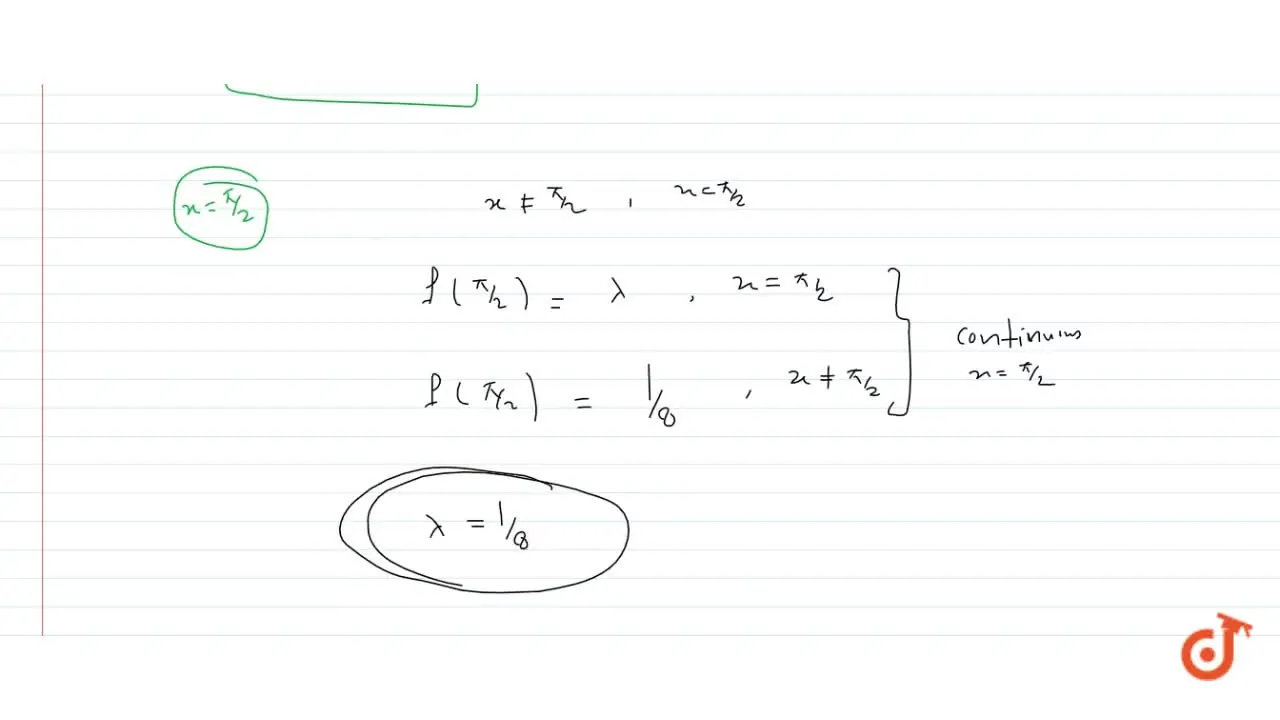If f(x)=1−sinx(π−2x)2,when x≠π2 and f(π2)=λ, the f(x) will be continuous function at x=π2,where λ=? (a)18 (b) 14 (c) 12 (d) none of these
The correct Answer is:Option (a)
∴f(π2)=(18)
\begin{aligned} &\mathrm{LHL}=\lim _{h \rightarrow 0} \mathrm{f}\left(\left(\frac{\pi}{2}\right)-\mathrm{h}\right)\\ &=\lim _{h \rightarrow 0}\left(\frac{1-\sin \left(\left(\frac{\pi}{2}\right)-h\right)}{\left[\pi-2\left(\left(\frac{\pi}{2}\right)-h\right)\right]^{2}}\right)\\ &=\lim _{h \rightarrow 0}\left(\frac{1-\cos(h) }{(\pi-\pi+2 h)^{2}}\right) \times\left(\frac{1+\cos(h) }{1+\cos(h) }\right)\\ &=\lim _{\mathrm{h} \rightarrow 0}\left(\frac{1^{2}-\cos ^{2} h}{4 \mathrm{~h}^{2}(1+\cos(h) )}\right)\\ &=\lim _{h \rightarrow 0}\left(\frac{\sin ^{2} h}{4 h^{2}(1+\cos(h) )}\right)\\ &=\lim _{\mathrm{h} \rightarrow 0}\left(\frac{\sin ^{2} \mathrm{~h}}{4 \mathrm{~h}^{2}}\right) \times\left(\frac{1}{(1+\cos(h) )}\right)\\ &=\left(\frac{1}{4}\right) \times 1 \times\left(\left(\frac{1}{1+1}\right)\right)=\left(\frac{1}{8}\right)\\ &\therefore\\ &\text { for } f(x) \text { to be continuous }\\ &\mathrm{LHL}=\mathrm{RHL}=\mathrm{f}\left(\frac{\pi}{2}\right)\\ &\therefore f\left(\frac{\pi}{2}\right)=\left(\frac{1}{8}\right) \end{aligned}
Related Playlists
Similar Questions
If f(x)=1−sinx(π−2x)2,when x≠π2 and f(π2)=λ, the f(x) will be continuous function at x=π2,where λ=? (a)18 (b) 14 (c) 12 (d) none of these
View SolutionIf f(x)={1−sinzxπ−2x,x≠π2λ,x=π2 , be continuous at x=π2, then the value of λ is
View SolutionIf f(x)=⎧⎪⎨⎪⎩1−sin(3x2)π−3xx≠π2λx=π2⎞⎟⎠ be continuous at x=π3 , then value of λ is (A) −1 (B) 1 (C) 0 (D) 2
View SolutionIf : f(x) 1−sinxπ−2x, ... x≠π/2=λ, ... x=π/2 is continuous at x=π/2 , then : λ=
View Solutionf(x)=1−sinx+cosx1+sinx+cosx discontinuous at x=π. Find f(π) so that f(x) is continuous x=π
View SolutionIf f(x)={1−sinxπ−2x,x≠π2λ,x=π2,be continuous at x=π2, then value of λ is
View SolutionConsider the function f(x)=1−sinx(π−2x)2 where x≠π2andf(π2)=λ
What is the value of λ. If the function is continuous at x=π2?View Solutionif f(x)=√2cosx−1cotx−1,x≠π4 Find the value of f(π4) so that f(x) becomes continuous at x=π4
View SolutionThe function f(x)=(sinx)tan2x is not defined at x=π2. The value of f(π2) such that f is continuous at x=π2 is
View SolutionLet f(x)=1+cosx(π−x)2.sin2xlog(1+π2−2πx+x2)x≠πkx=π
f(x) is continuous function at x=π then k is equal toView Solution


